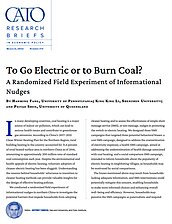We conducted a randomized field experiment of informational nudges in northern China to investigate the potential barriers that impede households from adopting cleaner heating and to assess the effectiveness of simple short message service (SMS), or text message, nudges in promoting the switch to electric heating. We designed three SMS campaigns that targeted three potential behavioral biases: a cost SMS campaign, designed to address the overestimation of electricity expenses; a health SMS campaign, aimed at addressing the underestimation of health damage associated with coal heating; and a social comparison SMS campaign, intended to inform households about the popularity of electric heating in neighboring villages, as households may be motivated by social comparisons.
The biases mentioned above may result from households lacking adequate information, and SMS interventions could potentially mitigate this concern, enabling households to make more informed choices and enhancing overall well-being and efficiency. However, households may perceive the SMS campaigns as paternalistic and respond by making choices that contradict the objective of the intervention. Our research finds evidence consistent with the latter possibility— that the SMS campaigns triggered unintended consequences.
Our study consisted of two stages. First, we conducted a survey with households that had both coal heating stoves and electric heating devices at home. The survey enabled us to gather information about households’ heating preferences, as well as factors that drive these preferences, and to elicit their estimates of the cost of electric heating and the health damage associated with coal heating. Second, we randomly assigned households that participated in the survey into one of four groups: a cost SMS, a health SMS, a social comparison SMS, or a group that did not receive any SMS. The cost SMS provided households with information about their actual daily electricity expenses and, on the last day of the intervention, their weekly expenses. The health SMS provided scientific evidence of the various health issues related to coal heating. The social comparison SMS provided information on the percentages of households in the neighboring villages that had transitioned from coal-burning stoves to electric heating devices. All interventions sent daily messages over an eight-day period in February 2019.
Our results show that a large proportion of households substantially overestimate their electricity expenses. Additionally, most households underestimate the health damage of coal heating; they believe that the negative impact of coal heating on life expectancy is minimal, but scientific evidence shows that prolonged exposure to air pollution from coal heating in the northern regions of China reduces life expectancy by 3–5.5 years. Furthermore, one could argue that some households might choose coal heating over electric heating because the lower costs of coal heating are realized in the short term while the health damages from coal heating are often invisible and only accumulate gradually. However, our survey asked about participants’ time preferences, and we found that households that weigh present benefits more heavily than future costs were not more likely to prefer coal heating. This suggests that many households use coal heating because they misunderstand the negative health effects, not because they underweight them.
Our research uses changes in electricity consumption as a proxy for changes in electric heating usage to analyze households’ responses to the SMS interventions. Specifically, we measured households’ electricity consumption for heating by taking the difference between households’ daily electricity consumption in the heating season and their average daily electricity consumption in October 2018, since most people begin to heat their homes in November. We obtained data on household-level daily electricity consumption from the electricity company for four weeks prior to the SMS intervention and six weeks after. We assessed the effects of the interventions by comparing the electric heating consumption of households in the groups that received SMS messages with that of the group that did not.
Our analysis reveals that none of the SMS campaigns had a positive effect on electric heating usage. In fact, the cost SMS reduced electric heating usage by 52 percent among households in that group. The intent of the cost SMS was to correct households’ overestimation of electricity expenses, but its backfire suggests an unintended consequence—the SMS messages may have increased attention to the cost of transitioning from coal to electric heating, therefore discouraging households from switching. Another potential reason for the backfire is that households perceived the SMS messages negatively as a paternalistic intervention and thus resisted it.
Our research finds that the treatments had different effects between households. The cost SMS did not impact households that overestimated cost, but it decreased electric heating usage by 76.8 percent for households that prioritized cost considerations. The health SMS did not impact households that underestimated the health damage of coal heating. However, it increased electric heating usage by 52.5 percent for households that already understood the health damage of coal heating and by 35.7 percent for households that reported health as an important factor in their heating choices. Moreover, the health SMS reduced electric heating usage by 54.5 percent for households that indicated a lack of concern regarding health consequences. The social comparison SMS increased electric heating by 148.3 percent among households that reported being concerned about their neighbors’ heating choices, which was only 12 percent of our survey participants.
Information nudges may appear to be a cost-effective way to promote electric heating, but our field experiment reveals their limitations and the potential for unintended consequences. Designing effective nudge interventions requires considering the differing beliefs and motivations of households. This entails targeting specific groups that are most likely to be receptive while avoiding groups that may resist or counteract the interventions.
NOTE
This research brief is based on Hanming Fang, King King Li, and Peiyao Shen, “To Go Electric or to Burn Coal? A Randomized Field Experiment of Informational Nudges,” National Bureau of Economic Research Working Paper no. 31841, November 2023.

